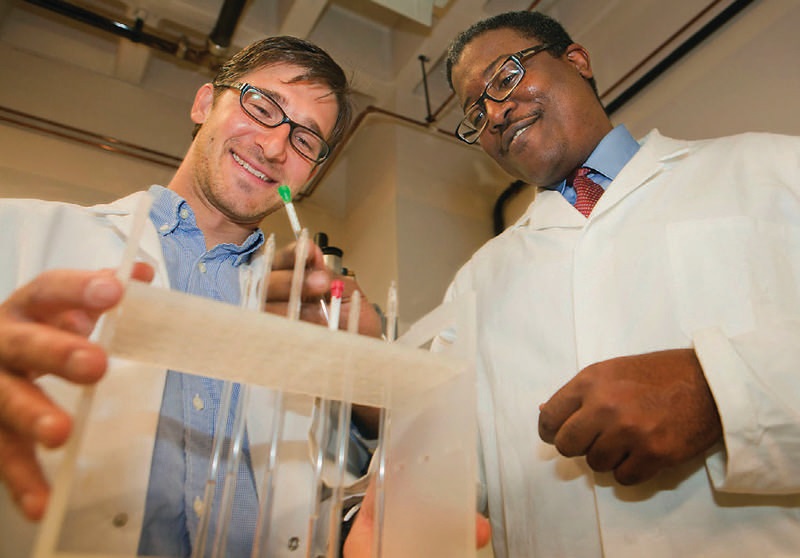One-step biodiesel process
Dr. Neil Canter, Contributing Editor | TLT Tech Beat January 2011
A new catalyst can convert cheaper feedstocks to produce biodiesel.
KEY CONCEPTS
•
Biodiesel must be prepared from cheaper feedstocks to be competitive with diesel derived from petroleum sources.
•
A new catalyst based on rare earth salts of triflate converts cheaper feedstocks to biodiesel in one-step.
•
The process utilizes a microwave reactor to achieve the conversion to biodiesel in high yield.
The viability of biodiesel as an alternative fuel is dependent upon reducing the raw material and processing costs so that they are competitive with diesel derived from petroleum sources. In attempting to accomplish this goal, several barriers must be removed because of the variability of the biodiesel process.
Biodiesel is a methyl ester of a vegetable oil such as soybean oil. The fatty oil is transesterified with methyl alcohol in the presence of a sodium methylate catalyst.
The strong demand for refined vegetable oils in food applications has led the industry to look at using inferior quality feedstocks containing significantly higher levels of free fatty acids and other impurities. In a previous TLT article, a new solid catalyst was discussed that can effectively convert free fatty acid to methyl ester (
1). The process achieves a 99% conversion in 1.5 hours, leading to a reduction of the free fatty acid content to less than the 0.5% level needed to convert the vegetable oil to biodiesel.
But the biodiesel process is still a two-step procedure. Jason Sello, assistant professor of chemistry at Brown University in Providence, R.I., has been studying Lewis acid catalysts derived from rare earth metal salts of triflate (also known as trifluoromethanesulfonate). He says, “We have been using these catalysts in other applications and found them to be very robust. Scandium and bismuth triflates are insensitive to air and water so that you can literally run reactions in an aqueous environment.”
Sello is working to find a more cost-effective way to produce biodiesel. He intends to start with a cheaper feedstock and envisions the use of bacteria to produce biodiesel precursors from plant biomass.
The hope is that a catalyst could be found that is sufficiently robust to convert cheaper vegetable oil feedstocks containing free fatty acids into biodiesel in one processing step. Progress to achieve this goal now has been realized.
MICROWAVE REACTOR
Sello utilized scandium triflate as a catalyst to convert mixtures of vegetable oils and free fatty acids to biodiesel in a microwave reactor. He says, “We initially tried to convert pure forms of vegetable oils such as glycerol trioleate to the corresponding methyl ester in refluxing methanol at 60 C. But neither catalytic nor stoichiometric quantities of scandium triflate were able to achieve conversion to the methyl ester.”
Sello then decided to try using a microwave reactor using 0. 2 to 0.5 milliliter reaction vials, as shown in Figure 3. This feature enabled the process to be run at a higher temperature.
 Figure 3. Small reaction vials were used in a microwave reactor to achieve a high yield conversion to biodiesel in one-step. (Courtesy of Mike Cohea, Brown University)
Figure 3. Small reaction vials were used in a microwave reactor to achieve a high yield conversion to biodiesel in one-step. (Courtesy of Mike Cohea, Brown University)
The researchers varied the ratios of the reactants, the catalysts and the temperature to find the ideal combination. Sello says, “We found that using a 48- fold molar excess of methanol with 1 mole % of the triflate catalyst at 150 C leads to a 99% yield after only one minute of reaction time.
A second metal catalyst, bismuth triflate also was used because of the environmentally friendly nature of this metal. Both the bismuth and scandium versions of this catalyst are equally effective.
The next step was to react a free fatty acid and a glycerol ester together in the presence of triflate catalyst. A 1:1 mixture of palmitic acid and glycerol trioleate was heated in a microwave with a 10 mole % excess of either bismuth or scandium triflate. Complete conversion was achieved in 20 minutes at 150 C.
A series of reactions were run with myristic, palmitic and linoleic as free fatty acids and were converted into glycerol triesters. In all cases, the triflate catalysts effectively converted both the fatty acids and the glycerol triesters into biodiesel in good yields.
For commercialization of this process to succeed, the catalyst must be durable. Sello indicates that both triflate catalysts can be reused without loss of effectiveness. He says, “Both catalysts can be recycled at least six times to convert palmitic acid to the corresponding methyl ester. The process affords a high conversion rate that remains consistent from the first time through the sixth time.”
Approximately 85% to 90% of the triflate catalyst was recovered after each reaction and then successfully used again. But the researchers ran into problems in recovering the catalyst after reaction with a glycerol ester.
Sello explains, “We could not recycle the triflate catalyst used in transesterification reactions with glycerol esters because of the presence of glycerol as a byproduct. It is likely that glycerol binds to the metal catalyst, making it more difficult to recover.”
With the successful use of the catalyst in relatively pure mixtures of fatty acids and vegetable oils, research next moves to evaluate the triflate catalyst in the processing of actual byproduct restaurant grease. Sello says, “Our university donates byproduct grease from its dining halls to a local biodiesel producer, Newport Biodiesel. We intend to carry out model studies with waste vegetable oil from Brown to evaluate the efficacy of our catalysts and reaction conditions.”
Additional information can be found in a recent article (
2) or by contacting Sello at
jason_sello@brown.edu.
REFERENCES
1.
Canter, N. (2008), “Biodiesel Production and Purification,” TLT,
64 (11), pp. 12–13.
2.
Socha, A. and Sello, J. (2010), “Efficient Conversion of Triacylglycerols and Fatty Acids to Biodiesel in a Microwave Reactor using Metal Triflate Catalysts,”
Organic and Biomolecular Chemistry,
8, pp. 4753–4756.
 Neil Canter heads his own consulting company, Chemical Solutions, in Willow Grove, Pa. Ideas for Tech Beat items can be sent to him at neilcanter@comcast.net
Neil Canter heads his own consulting company, Chemical Solutions, in Willow Grove, Pa. Ideas for Tech Beat items can be sent to him at neilcanter@comcast.net.